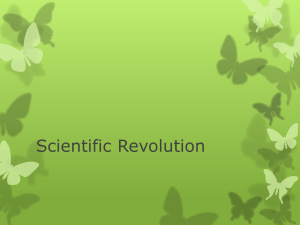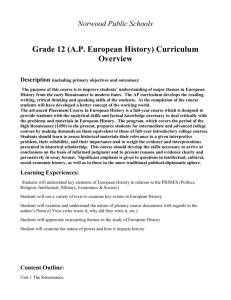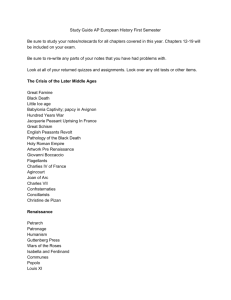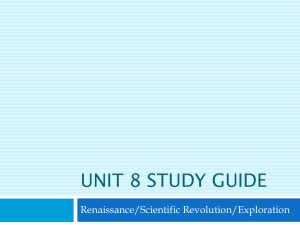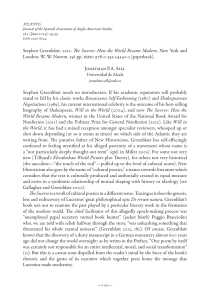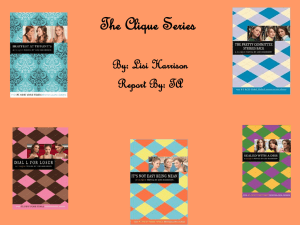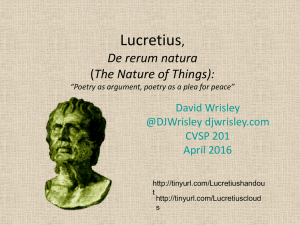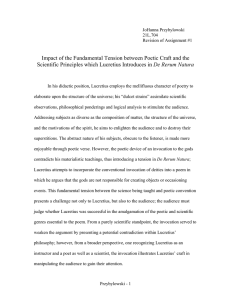AP and IB HL Summer Assignment 2013 Welcome to AP and IB
advertisement
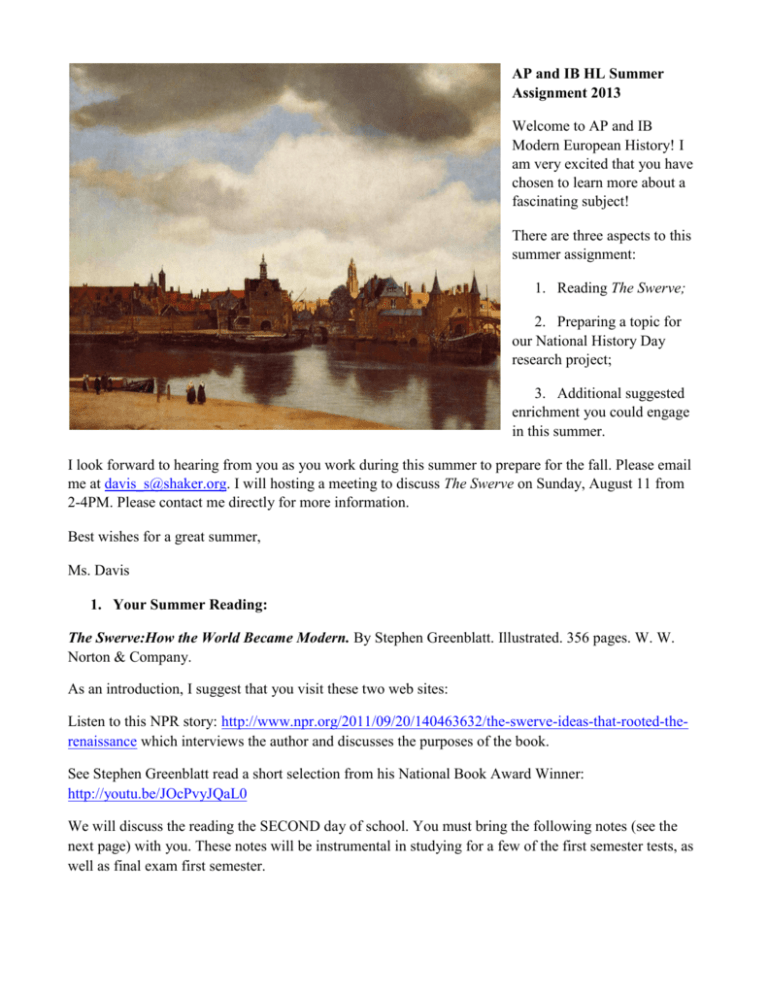
AP and IB HL Summer Assignment 2013 Welcome to AP and IB Modern European History! I am very excited that you have chosen to learn more about a fascinating subject! There are three aspects to this summer assignment: 1. Reading The Swerve; 2. Preparing a topic for our National History Day research project; 3. Additional suggested enrichment you could engage in this summer. I look forward to hearing from you as you work during this summer to prepare for the fall. Please email me at davis_s@shaker.org. I will hosting a meeting to discuss The Swerve on Sunday, August 11 from 2-4PM. Please contact me directly for more information. Best wishes for a great summer, Ms. Davis 1. Your Summer Reading: The Swerve:How the World Became Modern. By Stephen Greenblatt. Illustrated. 356 pages. W. W. Norton & Company. As an introduction, I suggest that you visit these two web sites: Listen to this NPR story: http://www.npr.org/2011/09/20/140463632/the-swerve-ideas-that-rooted-therenaissance which interviews the author and discusses the purposes of the book. See Stephen Greenblatt read a short selection from his National Book Award Winner: http://youtu.be/JOcPvyJQaL0 We will discuss the reading the SECOND day of school. You must bring the following notes (see the next page) with you. These notes will be instrumental in studying for a few of the first semester tests, as well as final exam first semester. Your tasks, both during and after you read this non-fiction account of a rediscovered manuscript which played a part in the Renaissance birth of ideas, new rebellions in thought, and the Scientific Revolution discoveries: 1. Keep a clear character list AND/OR a detailed timeline of people who interact, positively and negatively, with the Poem of Lucretius (pronounced “luucreesius”) and its ideas. 2. Write a 2-3 paragraph response explaining WHY the Renaissance involved hunting for books, according to Stephen Greenblatt’s understanding. 3. Write a 2-3 paragraph response explaining how the ideas of Lucretius’ poem changed ONE aspect of Renaissance culture: art, science, literature, or another aspect of Renaissance thought. 4. Write a 2-3 paragraph response explaining how the ideas of Lucretius’ poem led to one specific idea of the Scientific Revolution. In your answer, clearly include: do you find this a satisfactory link? Do you think Greenblatt is exaggerating the connections here? Why or why not? Each of these responses may be neatly handwritten or typed. All responses need to be uniquely yours. 2. Preparing for your NHD topic National History Day: Rights & Responsibilities in History Since this is the only long-term research assignment you will do during the entire school year, it is important that you choose a topic that will hold your interest. You will find it beneficial to do some initial searching, Check the website, nhd.org for theme and suggestions especially in the 19th and 20th centuries, this summer. I will be happy to respond to email inquiries and make suggestions. Some ideas include The French Revolution—choose ONE aspect The Enlightenment—choose one thinker or idea or event The Haitian Revolution The British Raj Immigration post World War II Religious groups under Communist Rule Economic rights and responsibilities in Communist Countries The Polish Diet (Parliament) The ending of Communist Rule in Europe Social Welfare states in Post War Europe The peaceful extension of British suffrage (choose one thinker or event) Women’s rights (choose one thinker or event) in the 19th or 20th Centuries Rights under Fascist Rule The Glorious Revolution The Napoleonic Code Peasant rights in the Netherlands or England in the 15th-17th Centuries Urban rights v. serf responsibilities in 15th-16th Century England or France 3. Additional, optional enrichment activities Immerse yourself in the Hollywood versions of medieval European history. You will find it interesting and fun, and should gain a sense about the culture and environment in which many events took place. They are especially useful for gaining an appreciation of the times. A few recommendations (Be aware that some of these titles are for mature audiences – always check with your parents for permission): Becket (12th century; gives perspective of struggle between church and monarchy) The Seventh Seal (deep; takes place during the Black Death) The Navigator (weird; time travel from 14th to 20th century) Lady Jane (the short reign of a teenage queen in England) Anne of a Thousand Days (Anne Boleyn, mother of Elizabeth) Elizabeth (covers earlier life leading to ascension to throne) Elizabeth: the Golden Age (covers her reign) Monty Python and the Holy Grail (why not?) The Name of the Rose (an insight into a medieval monastery) The Agony and the Ecstasy (Michelangelo and the painting of the Sistine Chapel) A Man for All Seasons (the life and death of Sir Thomas More) Shakespeare in Love (improbable story, but a great movie and look at Elizabethan culture) Some additional reading suggested by 2011-2012 European History Students: Tony Judt's Post War: Europe Since 1945 John Gaddis The Cold War: A New History. The Book Thief by Markus Zusak Year of Wonders by Geraldine Brooks Berlin Diaries by Marie Vassiltchikov At Home: A Short History of Private Life by Bill Bryson Seeing Further: The Story of Science, Discovery, and the Genius of the Royal Society by Bill Bryson (Nov 8, 2011) Catherine the Great: Portrait of a Woman by Robert K. Massie (Nov 8, 2011) The Royal Stuarts: A History of the Family That Shaped Britain by Allan Massie (Dec 20, 2011) A Distant Mirror: The Calamitous 14th Century by Barbara Wertheim Tuchman (Jul 12, 1987) The Guns of August: The Pulitzer Prize-Winning Classic About the Outbreak of World War I by Barbara W. Tuchman and Robert K. Massie (Aug 3, 2004) The Annotated Mona Lisa- A Crash Course in Art History by Carol Strickland and John Boswell (Jun 1, 1992) Revolutions Of 1848 A Social History by Priscilla Robertson The Return of Martin Guerre, by Natalie Zemon Davis.


